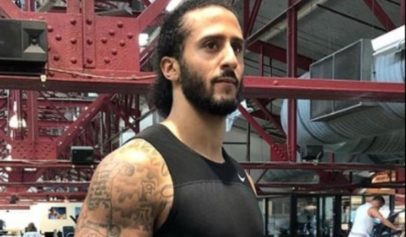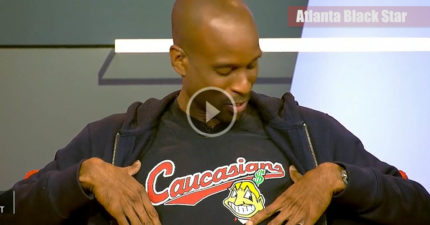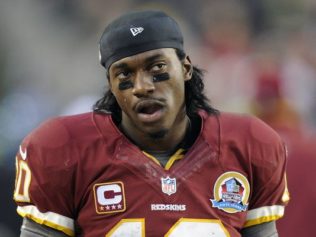For decades, Native American groups have mounted campaigns against offensive professional sports team names, such as the Washington Redskins and the Atlanta Braves, without success. But the movement is perhaps seeing a new surge of momentum after a group of 10 members of Congress sent a letter asking for a name change to Redskins owner Daniel Snyder, NFL Commissioner Roger Goodell, Redskins sponsor FedEx, and all the other NFL franchises.
The letter comes a month after the same congressional group introduced a bill in the House — which is not expected to gain any traction in the Republican-controlled body — prohibiting the Redskins from using the name.
But Redskins owner Snyder vows that he’s not budging.
“We will never change the name of the team,” he said earlier this month. “I think that the Redskins fans understand the great tradition and what it’s all about and what it means, so we feel pretty fortunate to be just working on next season.”
The NFL letter and the legislation were signed by the following members of Congress: Eni F.H. Faleomavaega (D-American Samoa), Tom Cole (R-Okla.), Betty McCollum (D-Minn.), Raul M. Grijalva (D-Ariz.), Gwen Moore (D-Wis.), Michael M. Honda (D-Calif.), Donna M. Christensen (D-Virgin Islands), Zoe Lofgren (D-Calif.), Barbara Lee (D-Calif.) and Eleanor Holmes Norton (D-District of Columbia).
Cole, the only Republican in the group, is a member of the Chickasaw nation.
In addition to the letter sent to the NFL and the legislation introduced in April, a group of Native American petitioners took on the NFL in a courtroom at the U.S. Patent and Trademark Trial and Appeal Board on March 7, challenging the team name “Redskins.”
Earlier this month, Washington, D.C. Councilman David Grosso introduced a proposal asking the Redskins to change its name to Redtails to honor the Tuskegee Airmen. And in February, the National Museum of the American Indian held an all-day symposium on the use of racist names and logos in sports.
At the U.S. Patent and Trademark Trial and Appeal Board, the petitioners argued before the three administrative law judges that the Redskins name should be declared offensive and the team should be stripped of its exclusive right to the name and logo, which would cost the team millions of dollars.
The petitioners told the judges that the word “redskins” is a racial slur — like “chink” or “wetback” or “raghead” or “the n-word”—and therefore shouldn’t be entitled to federal trademark protection, according to The Final Call.
Lawyers for the Redskins responded that the name is wholly well-intentioned and inoffensive, rooted in pride and tradition.
That same patent board 14 years ago actually ruled that the Redskins name could be interpreted as offensive to Native Americans, a violation of the trademark law that prohibits registration of a name that “may disparage … persons, living or dead … or bring them into contempt, or disrepute.”
But the decision was overturned on appeal because the plaintiffs who brought the case waited too long — and the Supreme Court in 2009 sided with the appeals court in ruling in favor of the team.
So now a group of six younger American Indian plaintiffs are at it again, making their case to the patent board.
A group of at least 50 Indian organizations, in addition to the National Congress of American Indians, have called for eliminating all Native American names and mascots in sports— a list that includes professional teams such as the Cleveland Indians and Atlanta Braves in Major League Baseball; the Washington and Kansas City Chiefs in the NFL; and the National Hockey League’s Chicago Blackhawks, among others.
Over the past 45 years, hundreds of schools have discontinued their use of Indian names and mascots after Indian groups began urging high schools and colleges to voluntarily drop names tied to Native Americans.
The current NCAA policy prevents schools with American Indian-related names from participating in championship or playoff games—though the Florida State University Seminoles and the University of Utah Utes were given exemptions from the ban since they had worked with the local tribes to gain their permission and to ensure the names and images were used in a respectful manner, according to the IPS news service.
At a symposium at the National Museum of the American Indian, former U.S. Sen. Ben “Nighthorse” Campbell said the four most offensive words ever spoken to him were “savage,” “squaw,” “buck,” and “redskin.”
Even dictionaries today routinely label “redskin” as often or usually offensive.
The term “redskins” actually refers to the Indian skin and body parts — including genitalia — that bounty hunters had to show to receive payment for killing Indians, attorney Suzan Shown Harjo told The Final Call. “To many Native Americans, the term ‘Redskins’ is associated with the barbaric practice of scalping.”
“The organizations and Indian tribes stand together to express with one voice their collective opinion on the fundamental fact underlying this case: the ‘Redskins’ trademark is disparaging to Native Americans and perpetuates a centuries-old stereotype of Native Americans as ‘blood-thirsty savages,’ ‘noble warriors,’ and an ethnic group ‘frozen in history,’” NCAI argued in its court papers filed before the Supreme Court.
Between 1996 and 2002, the patent office rejected at least three attempts by the Redskins to register new brands using the word, in each case citing disparagement as the grounds for action.


